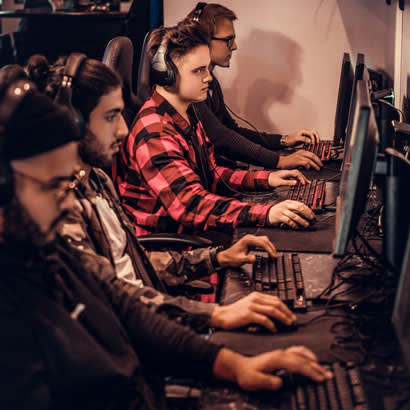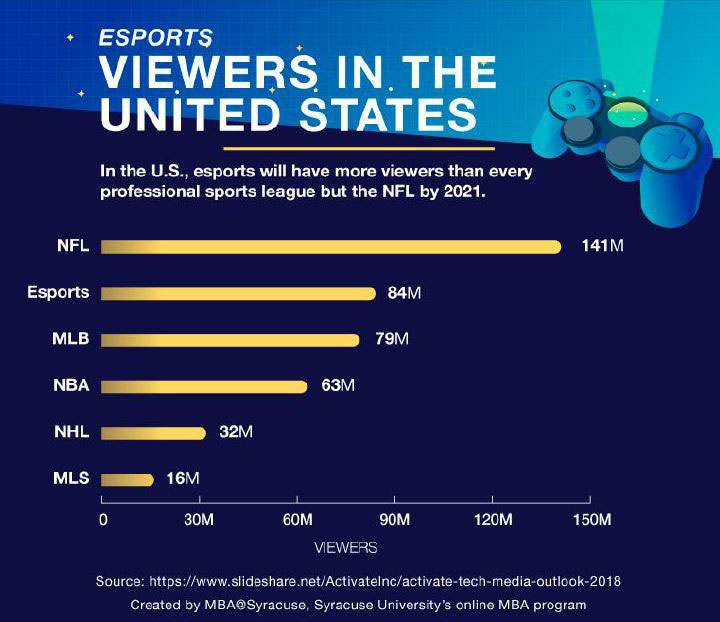
Looking for ways to provide an exciting, new activity to your local community? Want to learn more about how you can embrace the hobby of over 64 million kids within the United States? Esports is a community and growing industry that provides opportunities for all age groups. Whether it’s the neighborhood kids down the road working on being the best Rocket League team in the neighborhood, or high school students looking for other engaging extracurricular activities focused around their passion for gaming, esports players can demonstrate their pride by competing to be the best in their community. Esports provides a multitude of options for educational and recreational engagement via athletics, education and even future careers.
So, What Even Is Esports?
Esports is a term used to describe organized, competitive video gaming. Esports are typically player vs player games, played in a league or tournament structure. Similar to regular, professional sports teams, esports is also a spectator event.
According to Syracuse University’s viewership projection data, esports reaches more viewers than all other major sports leagues, with the exception of the NFL. Twitch, which is owned by Amazon and is the leading streaming service for esports, also averages around 15 million daily viewers.

Esports is a growing trend within Parks and Recreation, but how many kids are actually gaming?
- There are 2.5 billion gamers worldwide
- Over 166 million adults within the U.S. consider themselves ‘gamers’
- 64 percent of U.S. households own a gaming device (PC, or gaming consoles)
- There’s an average of around two gamers per household in the U.S.
- 56 percent of regular gamers play multiplayer titles (including esports such as Rocket League, Overwatch, Super Smash Brothers and more!)
- 65 percent of gamers often play with another person, both in-person and online
- Over 84 percent of teens have access to a gaming console within their home
Why Do Esports and Recreation Make Sense?
Kids who begin recreational sports programs through their parks department may continue with the sport throughout middle school, high school and even college. At the collegiate level, kids can also earn scholarships for their participation with varsity esports. Should a kid excel within their sport, they have the potential to take their passion to the professional level. Youth sports are often widely regarded for the sportsmanship, teamwork and cooperation skills they teach kids. Much like the traditional youth sports pipeline and the qualities kids learn through them, esports leagues provide those same life lessons.
Rocket League, for example, is a very popular and competitive esport currently. On paper, Rocket League is just a team-based soccer game. The only difference is instead of controlling a virtual soccer player like in FIFA, players control a car that can jump, flip and fly through the air using boost! Just like in traditional soccer, players must communicate effectively and coordinate their plays with each other in order to be effective and score a goal. As players improve in Rocket League, they will also improve other mental capabilities, such as situational awareness, balancing emotions, knowing the self, and concentration in both children and teens. Team-based esports activities, similar to traditional sports, emulate teamwork and kinship, but provide children and teens a unique opportunity to embrace their hobby in a structured environment through your park department. The same can also be said for esports titles like Super Smash Bros. that sometimes operate in 1v1 solo competition. Solo leagues give kids a structured environment to compete in and learn sportsmanship skills such as having a healthy attitude towards losing, while gaining a better understanding of what they need to improve on within the game. Players who have participated in GGLeagues recreational leagues have even noted keeping in contact with their opponents after their match and continuing to game together!
“My son has been a social butterfly on the Fortnite circuit. He is currently in his 2nd league and each time he meets an opponent they eventually end up becoming gaming friends. It has kept him social throughout the pandemic.” — Town of Dover resident
Esports are social events; through playing with others on teams or via co-op games, and playing against unique opponents on a regular basis, games pave the way for relationships to form within your community that may not have been nurtured otherwise. Whereas traditional sports leagues are confined to specific locations, esports provides the ability for friendships to be made in a multitude of different areas, whether within your community or with children from the county next door!
Esport leagues also provide opportunities for children unable to participate in traditional youth sports, whether it be due to a disability, overstimulation or pressure. For those with physical disabilities, companies like Microsoft have created adaptive controllers, which allow players to tailor the controller and buttons exactly to their specific needs. With these controllers, esports leagues become a level playing field, regardless of physical ability.
Individuals on the autism spectrum also benefit from esports leagues — traditional youth sports venues may often be overstimulating for someone on the autism spectrum. Gamers who have autism can participate in a competitive league from the comfort of an environment they’re familiar with, and begin to understand concepts such as strategic and flexible thinking, hand-to-eye coordination, and teamwork. According to a study from the Journal of Social Psychiatry, gaming can also assist in improving socialization skills, and understanding social cues.
What Is the Path of Esports in My Community?
According to the National Alliance for Youth Sports Poll, 70 percent of kids stop participating in traditional sports, such as little leagues and recreational teams, by the age of 13. Likewise, 90 percent of 12-17-year-olds participate in playing video games. Gaming is a hobby that sticks with youth throughout the majority of their life. As they explore other gaming opportunities outside of the recreational level, it’s worth noting many high schools and colleges are also beginning to provide esport programs. More than 1,200 high schools and 300 colleges now have programs, many of which also often provide academic support. Through these programs, teens can begin to learn career paths they could take within esports — going pro is not the only avenue. Team management, event production, broadcasting and even sports health all fall within the realm of esports. Boise State, for example, provides opportunities to learn esports broadcasting and production. Other examples include University of California Irvine, which provides multi-avenue opportunities for students into different esports professions. Via connecting with local colleges and high schools, park and recreation agencies can begin to foster ‘esports ecosystems’ in their community. Scholarships could be awarded for winning leagues, and departments can find ways to engage their community via the varsity programs these schools may offer.
Conclusion
As the use of technology increases among kids and teens, virtual recreational activities will continue to grow and evolve. Gaming is no longer the antisocial, single player experience that many people remember growing up with. Unlike other sports, esports ignore the disadvantage of disabilities that physical sports are affected by, and ignore the boundaries of distance when it comes to making friends. No other competitive activity is able to provide the opportunity for connection and kinship like esports. As we move into the future, finding ways in which we can support our youth through recreational events and activities that are new and exciting will not only help us to learn more about the new generation, but embrace the diversity and competitive nature of our community through an exciting new event. Gaming is present in over 40 percent of households in the U.S. — in comparison, only 38 percent of kids participated in physical sports in 2018, a number that has dramatically decreased over the years. The love of gaming continues to grow with children throughout their teen and adult years. Gaming provides an opportunity for players to grow a wide array of social and emotional skills on top of just their gaming skills, as well as a social outlet for everyone within your community.
Ivy O'Shaughnessy is a partner success manager for GGLeagues.
Greg Boehm is a partner success manager for GGLeagues.
Sources:
Twitch Revenue and Usage Statistics (2021)
EdTech Magazine: Esports Programs Start to Pop Up in K–12 Schools
Video Game Demographics – Who Plays Games in 2021
Aspen Institute Project Play Survey: Kids Quite Most Sports By Age 11

